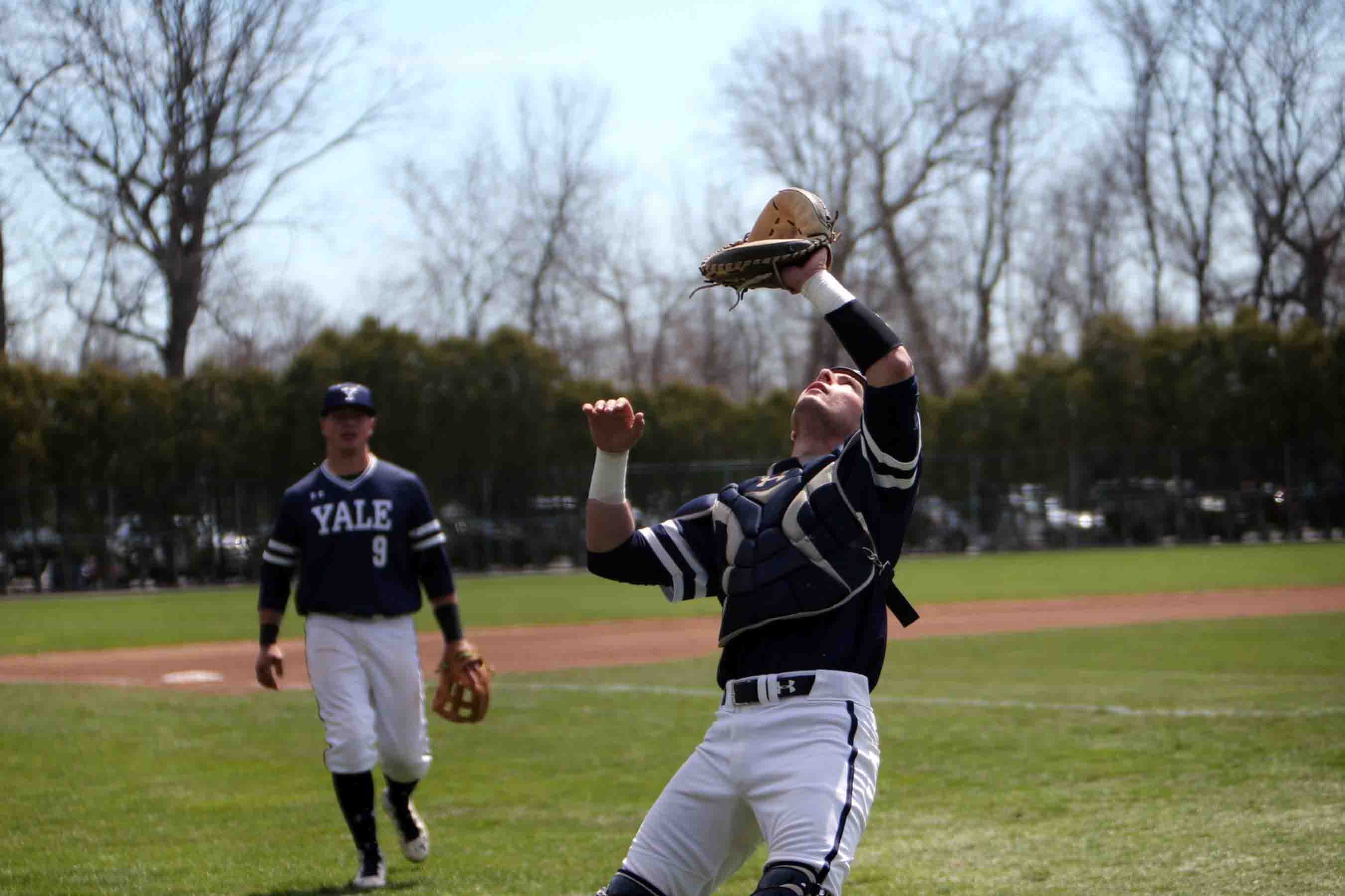
Yale Athletics
Four-game weekends are routine for both the Yale baseball and softball teams during their five weeks of conference play. While the Bulldog squads rotate fielders and pitchers over the course of two weekend doubleheaders, both sides have relied on a constant presence behind the plate.
Baseball catcher Andrew Herrera ’17 and softball catcher Madison Sack ’19 have each started every conference game for their teams, and in doing so have assumed unique leadership roles.
“The catcher is the controller of the pace of the game,” baseball captain and third baseman Richard Slenker ’17 said. “You could call him the on-field manager. There’s a good saying, ‘you never notice a good catcher,’ and that’s because when they’re doing their job, everything runs smoothly.”
Herrera began playing baseball at a young age and gravitated toward catching because the constant engagement of the position excited him more than the fielding positions did. As a catcher, Herrera describes his style as “very hands-on and loud.” He does not hesitate to communicate with the pitcher, whether with constructive critiques or with compliments and encouragements.
“He works hard behind the plate,” Slenker said. “[He] really does a good job leading us on the field. I think a lot of guys, especially pitchers, look to him as a real confidence builder. I think it’s a really good thing for the younger guys to see.”
In addition to his defensive work, Herrera has improved his abilities on offense in his growing role on the team. The senior has boosted his batting average, on-base percentage and slugging percentage in every year of his college career, and currently ranks eighth on the team with a 0.279 batting average.
Similarly to Herrera, Sack was drawn to catching early on in her softball career. After starting out playing third base and pitcher at the age of seven, she quickly showed a preference for catching, and has been donning the mask and shin guards since then.
Softball pitcher Francesca Casalino ’18, who has complemented Sack in the Yale battery this season, praised the sophomore for her talent, knowledge of the game and ability not only to handle high-pressure situations but also to direct her teammates through them.
Sack has led by example both behind the plate and in the batter’s box this season. Her 21 runs batted in and 37 total bases rank first and second, respectively, on the team, and her six home runs represent the fourth highest total in the Ivy League.
According to softball captain and first baseman Camille Weisenbach ’17, who played catcher during her junior year, the ability to see the entire field allows Sack to control the pace of the game and direct her teammates. Thus, Sack said, her collegiate softball career has taught her the value of strong communication in the success of the team.
“It’s an incredibly vocal position,” Weisenbach said. “You have to have a lot of confidence in your own game knowledge, your ability to make decisions and your ability to stick to your gut. You have to call something hopefully right, but at least very loud and very quickly so that everyone is on the same page.”
Starting catchers in Yale’s two programs are typically upperclassmen because of the position’s responsibility of vocal leadership, according to Weisenbach and Herrera. Herrera said collegiate baseball is much more demanding than high school baseball, and that athletes generally take time to mature into college-level players. Weisenbach added that younger catchers face difficulty coming onto a new team, but quickly gain the familiarity and confidence to direct teammates in a game.
While the Bulldog baseball and softball squads almost always reserve their catching duties in conferences games for upperclassmen, younger backstops also have opportunities to see time during the regular season, according to Herrera. After spending his freshman year catching midweek games against nonconference opponents and learning from his predecessors, the senior took on the role of the everyday catcher in his sophomore year.
“There are definitely a lot of ways to get exposure and stay sharp and get practice,” Herrera said. “The other two catchers we have are very talented. The two of them will also definitely be playing on the weekends down the road.”
As several baseball and softball players agreed, playing four conference games for five straight weekends is both physically and psychologically demanding. According to Weisenbach, the most challenging physical aspect of catching is the toll it takes on catchers’ joints, as they spend their weekends in a squat or dropping to their knees and sliding to prevent balls from hitting the backstop. With this extra strain in mind, both Weisenbach and Herrera emphasized the importance of catchers proactively taking care of their bodies in preparation for the weekend series.
“It starts two days prior to the weekend when I start drinking a lot of fluids and start resting up,” Herrera said. “I know that those 32 innings that we’ll play over the course of the weekend is a grind. It’s a lot, and you need to be sharp for all of it.”
According to Herrera, psychological preparation is just as valuable. The Allendale, New Jersey native sees catching as a mindset that requires laser-like focus and full engagement. Members of the softball team echoed Herrera’s comments, underscoring the importance as a catcher of entering each series with positive self-confidence on which the team can build.
“The preparation usually comes before each pitch,” Sack said. “Anticipation is extremely important. I always must anticipate the next play: what to do if the ball goes to me, where to direct the other players if the ball goes to them, where the batter is going to hit the ball based on the pitches that are called.”
Both Yale teams will take on Dartmouth this weekend for four games apiece.







